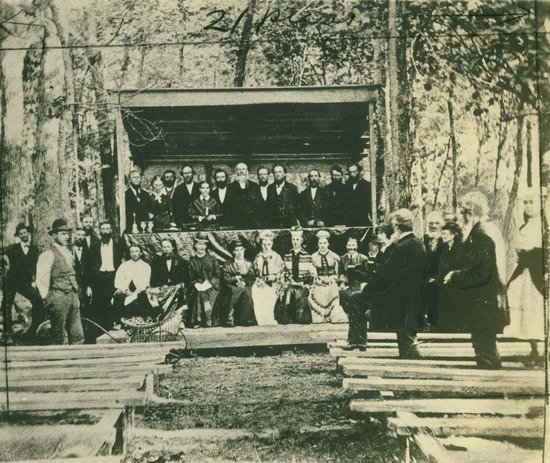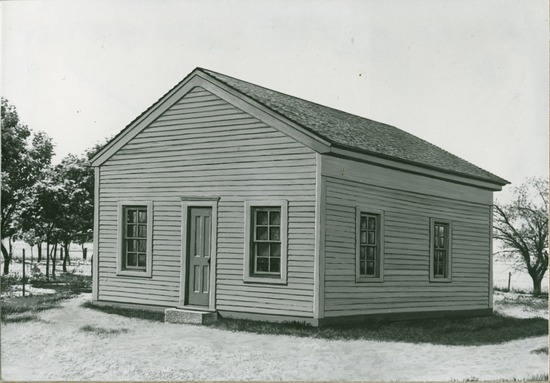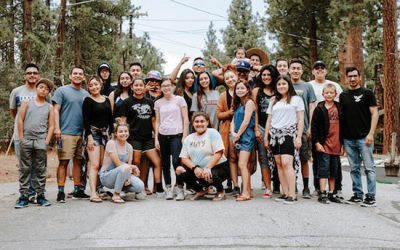Although camp meetings didn’t begin with the Seventh-day Adventist Church, they’re as much an Adventist thing as haystacks.
Camp meeting is an extended event for Adventists (and non-Adventists) of all ages to gather and participate in spiritual seminars and activities. During the event, attendees often camp in tents, campers, or RVs.
Whether a weekend or ten days, the focus of the time is strengthening personal faith in Jesus and connecting the community of believers.
We’re going to dive into the following details:
- How camp meetings started
- What Adventist camp meetings are like today
- Why we still hold camp meetings
- Who can attend
- How to find a camp meeting near you
To begin, let’s take a brief tour of its history.
How camp meetings started

Courtesy of the Ellen G. White Estate, Inc.
The first camp meetings, as we know them today, started during a Presbyterian revival in Kentucky in the 1800s. At the time, another Protestant revival, the Second Great Awakening, was early underway.
The event was dubbed a “camp meeting” because the attendees camped out in their wagons and tents.
We don’t know how many attended, but at the same camp meeting the next year, between 20,000 and 30,000 people flocked to hear the preachers.1
The fervor quickly spread to other denominations, who began holding their own.
Adventists weren’t far behind.
Here’s how their camp meetings came about.
The first General Conference session had been held in 1868, but the people who attended came away disappointed at how business-like and dry it was. They had expected spiritual encouragement.2
James White, one of the founders of the Adventist Church, caught on to the sentiment. After some thinking, he suggested holding a “campmeeting,” an event that would be free from business and focus on spiritual matters.3
His plan was quickly put into action.
A couple months later, in September 1868, the first Adventist camp meeting took place in Wright, Michigan. It drew a crowd of over 2,000—among them James and Ellen White and J. N. Andrews. The meeting was so successful that they planned two more for that year in other states.4
Since then, Adventist camp meetings have become annual events across the United States and even the world.
What an Adventist camp meeting is like today
Camp meetings today are in many ways similar to when they started. They’re generally held sometime between late spring and early summer. The programming still focuses on spiritual growth and revival. And many people still camp, too.
But unlike those of old, today’s participants don’t always stay in tents—they may bring an RV or camper, or rent a cabin. Many also stay in other people’s homes or in housing provided by the church.
Some meetings take place on school campuses, where camping isn’t always conducive. There, attendees might stay in dorm rooms and convene in a gym or auditorium instead of under big white tents.
Length
Although many meetings are still the traditional week in length, some are as long as nine days, and others are just a weekend or Sabbath convocation.
Cost
Camp meeting can be as inexpensive or as expensive as you want it to be. If you come just for the day and bring your own food, or stay at someone’s house, it’ll be free. But to eat at the cafeteria, have a campsite, or join certain workshops, you will most likely have to pay a fee to help cover costs.
Programs
Another feature today is programs for different ages. Children can take part in classes geared for them, while adults can go to adult classes. But there is also time throughout the day for families to participate in events together.
Let’s get a feel for what that might look like.
A typical camp meeting schedule
Every camp meeting will have its own variations in programming and time segments, but here’s a basic outline of a day:
- Prayer session. Rise and shine! This is generally the first event of the day and could be as early as 5:00 in the morning. Here, participants pray for each other and have a devotional time to kick off the day. However, this, as with every other event, is optional, so don’t worry if you’re not an early riser!
- Breakfast. Campers may cook their own, and usually, the cafeteria provides something for a fee.
- Activities and workshops. These activities focus on specific practical topics for Christians and are usually divided by age. They may last an hour or two. On Sabbath, this time slot is reserved for Sabbath School.
- Morning meeting. This event is typically two hours long and is divided by age to best suit the wide range of people. Classes are held for infants (0–2), kindergarteners (3–6), primary ages (7–9), juniors (10–12), earliteens (13–14), youth (15–18), and young adults (19+). Adults attend the main meeting and listen to a guest speaker. Over the years, these guest speakers have included well-known Adventist evangelists like Shawn Boonstra, Doug Bachelor, or John Bradshaw. On Sabbath, this period is the main church service.
- Lunch. Once again, families may prepare their own midday meal or go to the cafeteria.
- Afternoon workshops. Like morning workshops, this section of the day could include many different activities for all age ranges.
- Afternoon meeting. Each age group will have its own activity or seminar for another hour or two.
- Supper and family time. This slot gives families the opportunity to spend some time together and catch up with friends.
- Evening meeting. One last event closes out the day. Sometimes, it’s a concert; sometimes, it’s a meeting like the others during the day. This usually ends by 9:00 pm or so.
Participants can pick and choose what activities and seminars they’d like to attend throughout the day to take advantage of the many benefits of the camp meeting program.
Why Adventists still hold camp meetings
The event serves many purposes, but the main one is to revive and enrich the spiritual lives of those who attend.5
Sometimes, the cares and frustrations and worries of life can seem overwhelming. But camp meeting offers a hiatus from all that to focus on what really matters: your spiritual life.6 It’s a time to rest and take in encouraging, wholesome thoughts.
But you might be thinking, I can do that at church or on my own. Why camp meeting?
Camp meeting isn’t just about individual spirituality. It’s also a huge community revival that connects the larger church body to encourage each other, build each other up, and learn together.
Friendship is a key aspect of that. At events like camp meeting, we have the chance to catch up with friends we don’t often see.
It also gives us a chance to reach out. You may run into people who aren’t Adventist—and maybe not even Christian. This is your opportunity to befriend and welcome them into the community, answering questions they might have along the way.
Who can attend camp meeting?
Anyone! All are welcome and encouraged to come, whether they attend an Adventist Church, another church, or no church at all.
Especially for those who are new to the Christian faith, camp meeting is a great way to meet Adventist Christians in a more casual setting. You don’t have to know, do, or be anything to learn about Jesus Christ and His love.
How to find a camp meeting near you
The best way to find your nearest yearly camp meeting is to ask your local pastor or someone else at your Adventist Church. You can also search online for ones in your state.
These are a few of the ones in the North American Division of Seventh-day Adventists (NAD):
- Soquel: Central California
- Rocky Mountain: Several meetings in Wyoming and Colorado
- Carolina: North Carolina
- Wisconsin
There are also camp meetings for different cultures and languages, such as Campestre Hispano in various states for Spanish speakers or the Native American Camp Meeting.
And if you can’t attend in person, some have livestream or video archives available.
Camp meeting has been part of Adventist culture for a long time. And though times have changed and we don’t camp in wagons anymore, one thing remains the same:
The need for humans to connect with Jesus and one another.
Camp meetings help meet that need.
If you’d like to learn about other Adventist ministries that bring people together,
- Spangler, J. R., “Workshops for Spiritual Revival,” Review and Herald, May 30, 1968. [↵]
- Poirier, Merle, “Camp Meeting,” Adventist Review.org. [↵]
- Ibid.[↵]
- Ibid. [↵]
- “Why Camp Meetings?” Ministry Magazine. [↵]
- Spangler, J. R., “Workshops for Spiritual Revival,” Review and Herald, May 30, 1968. [↵]
Related Articles
More Answers
How Adventists interpret Bible prophecy
Bible prophecy conjures up a variety of emotions in people. For some, it feels exciting or mysterious.
Moviegoers’ Guide to The Hopeful: The Facts Behind the Film
Learn where and when you can watch The Hopeful and how to get tickets. Already seen it? We’ll uncover the real story that inspired this film.
How Are Seventh-day Adventists Different from Other Protestants?
As a Protestant Christian denomination, the Seventh-day Adventist Church regards the Bible as the ultimate guide and looks to Jesus Christ as the only way to salvation. We do have some differences of belief or interpretation when it comes to topics like Bible prophecy, end-time events, the Sabbath, and a person’s state after death.
How Adventists Handle Death and Funerals
Most Seventh-day Adventist funeral services are similar to those of other Protestant denominations, such as Methodists, Baptists, or Presbyterians, but you might find a few differences or unique nuances.
Do Seventh-day Adventists Believe Only They Will Go to Heaven?
No, Adventists definitely don’t believe they’re the only ones that will go to heaven. As a matter of fact, we don’t believe admittance into heaven is ever based on which church or denomination we belong to. People all over the world from different Christian denominations, religions, and walks of life will be welcomed by Jesus.
What Is Children’s Sabbath School in the Adventist Church?
Children’s Sabbath School is a Bible program offered every Sabbath at Adventist churches for children from birth to age 18. These classes give children the chance to learn Bible stories, make new friends, and participate in fun activities.
Do Adventists Observe Easter-Related Holidays?
Jesus Christ’s resurrection, celebrated on many Easter-related holidays, is central to the beliefs of the Seventh-day Adventist Church. And that means we seek every opportunity to remember it.
An Overview of Seventh-day Adventist Higher Education
The Seventh-day Adventist Church has about 118 tertiary schools around the world. Though many of them are within North America, you’ll also find Adventist universities in countries across the world—places like Croatia, Austria, Brazil, Madagascar, and the Philippines.
The Ten Commandments from a Seventh-day Adventist Perspective
Ever eaten a salad and gotten a big piece of green stuck in your teeth? And you didn’t realize it was there until you looked in the mirror? (Because no one ever told you!)
The Benefits of A Seventh-day Adventist Academy
Adventist academies are high schools (grades 9-12) that are owned and operated by the Seventh-day Adventist Church.
Are Seventh-day Adventists Christians?
Yes, the Seventh-day Adventist Church is a Protestant Christian denomination formed in 1863. Just like other Christians, we believe that Jesus Christ is our Savior and seek to follow the principles of the Word of God.
Adventist Movies: Where Faith and Film Meet
The Seventh-day Adventist Church’s mission from the beginning has been to share God’s truth in the Bible. And as times have changed, we’ve explored new ways of doing this—one of those being movies.
Do Adventists Celebrate Christmas?
In general, most Seventh-day Adventists do celebrate Christmas.
Since our denomination doesn’t have specific guidelines about holidays, it’s up to each member to decide whether to celebrate it based on their personal convictions and study of the Bible.
What Does the Bible Say About Modesty
Seventh-day Adventists and Christians in general try to ensure their outward presentation and lifestyle glorify God. This often involves daily habits like the ways we hold conversations, the ways we dress and accessorize, and the ways we regard other people when we’re out and about.
How Do Adventists Make Movie and Music Choices?
We have entertainment at our fingertips. With just a tap on our smartphones, we can access all the latest movies, music, YouTube videos, and more.
Does the Seventh-day Adventist Church Believe in Paying Tithe?
Seventh-day Adventists believe in paying tithe and offerings based on the biblical command and our commitment to being wise stewards of God’s resources. These donations help fund the mission of the Adventist Church by supporting pastors, missionaries, church expenses, and evangelistic projects, among other things.
Seventh-day Adventist World Population and Demographics
Did you know that the Seventh-day Adventist Church has more churches around the world than all the Pizza Hut, McDonald’s, and Subway restaurants combined.
How to Join the Seventh-day Adventist Church
Whether you heard about the Seventh-day Adventist Church through a traveling evangelist, during your online searches, or through a loved one or relative, you might be considering joining yourself.
How Do Adventists Do Baby Dedications?
For Christians, dedication ceremonies for babies, also for older children, are an important time for parents and the church. It’s a special part of the worship service when parents present their young children to God and the church family. Both parents, along with the congregation, regard this as a solemn promise to be a Christ-like example to the child.
Do Adventists Celebrate Communion and Foot Washing?
Like many Christian denominations, Adventists regularly participate in communion, also referred to as the “Lord’s Supper” or the “Last Supper.” They also practice foot washing (John 13:1-20), or the “ordinance of humility,” during the service—which isn’t as common.
What is the Concept of “Present Truth” and Why is it Important?
Present truth is the principle that certain biblical truths are relevant to God’s people at specific times in history. God sends the Holy Spirit to reveal truths that help us better understand how to interpret and apply His Word in a present moment.
Do Seventh-day Adventists Celebrate Easter
Yes, many Seventh-day Adventists do celebrate Easter.
Does the Adventist Church Have Youth Ministry Programs?
The Seventh-day Adventist Church has been organizing and operating youth ministry programs since 1879.
In our opinion, youth ministry is one of the most important ministries a church can have.
Do Adventists Celebrate Birthdays?
Yes, most Seventh-day Adventists do celebrate birthdays because we see them as excellent reminders of the life God has blessed us with. And we celebrate them the same way everyone else does—with friends, family, presents, and a special meal.
Sola Scriptura—What It Means and Why It Matters
Sola scriptura is a term that originated during the Protestant Reformation. It represents the way many Christians view the Bible and its authority. While the idea is simple enough, there is so much more to sola scriptura than its basic definition.
What Do Adventists Offer for Young Adults?
In recent years, the age group often classified as “young adults” has been trickier to engage. It’s been a significant concern for Christian churches around the world. Though interestingly enough, similar observations regarding young adults have been coming up in conversations about the economy, the entertainment industry, politics, and more.
Do I Need to be an Adventist to be Saved?
The answer to this question is simply, “no.”
When it comes to salvation in Jesus Christ, all that is required of a person is to acknowledge Jesus’ sacrifice for us, believe that He has saved us, and claim the free gift of salvation that is always available to us. Salvation is not based on denomination.
Do You Have to Be Vegetarian to Be Adventist?
Of course not. Membership in the Seventh-day Adventist Church has never included any dietary requirements. However, there might be some reasons people might think that. So many Adventists are vegetarians or even vegan, and a plant-based lifestyle has many health benefits.
All About Seventh-day Adventist Colporteurs
The Seventh-day Adventist Church uses a variety of methods to spread the hope of the gospel to the world. One of these ways is through colporteuring, also called “canvassing” or “literature evangelism.”
Didn’t find your answer? Ask us!
We understand your concern of having questions but not knowing who to ask—we’ve felt it ourselves. When you’re ready to learn more about Adventists, send us a question! We know a thing or two about Adventists.
































